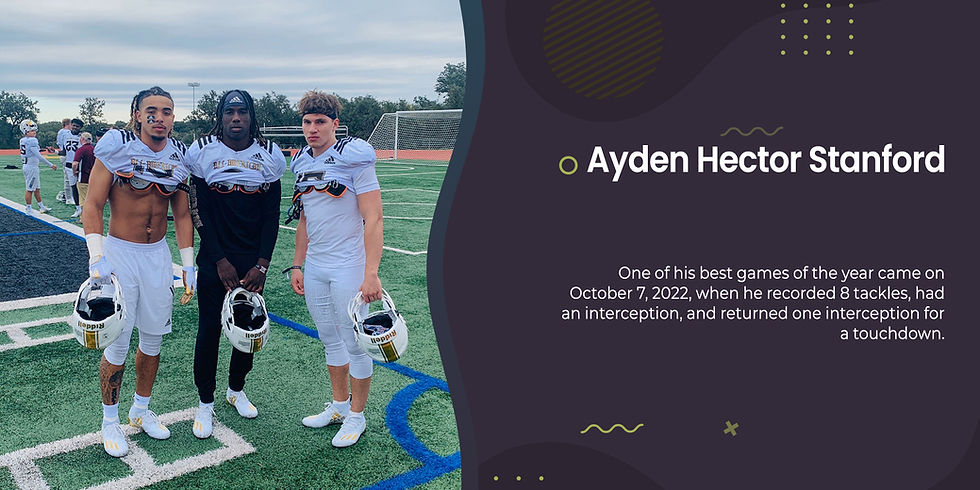Balancing Act: Managing Academics and High School Football
- Ayden Hector Stanford
- Nov 5, 2025
- 4 min read

It’s Friday night. The lights are blinding, the crowd is electric, and the sound of cleats against turf echoes through the cool evening air. This is what it’s all about for high school football players—the thrill of competition, the pride of representing their school, and the sense of brotherhood that forms on the field. But another challenge awaits when the final whistle blows and the adrenaline fades. There’s homework to finish, projects to prepare, and grades to maintain. Balancing academics and football is a demanding task, but with the right mindset and habits, it can be one of the most rewarding experiences of a student’s life.
When the Whistle Blows and Reality Returns
Many players describe a familiar moment at the end of every game. The helmet comes off, the cheers die, and the weight of school responsibilities rushes back in. There’s a chemistry quiz on Monday, an English essay due midweek, and maybe a history project waiting on the desk at home. For some, this juggling act can feel like running two marathons at once.
But this is where growth happens. Balancing schoolwork and sports pushes students to develop focus, resilience, and maturity earlier than most. It’s not just about making plays on the field—it’s about managing time, keeping promises, and staying disciplined when distractions pile up.
The Daily Challenge of a Student-Athlete
A day in the life of a high school football player starts early and ends late. Morning alarms buzz before sunrise, breakfast happens on the go, and classes stretch from one subject to another with barely a breather. Once the final bell rings, there’s no real “after school” for athletes. Practice follows, sometimes lasting several hours. Then comes the commute home, dinner, and a mountain of homework waiting for attention.
It’s exhausting, no question. But in this chaos lies the foundation of habits that build success. Players learn how to prioritize, multitask, and handle pressure. These lessons go far beyond high school—they’re the same skills that prepare young adults for college, careers, and life.
Creating a Routine That Actually Works
The key to balance is routine. Every athlete who thrives in school and sports has found a rhythm that fits their life. It might not look the same for everyone, but consistency is the secret ingredient. Some students use lunch breaks or study halls to review notes. Others knock out assignments before dinner so the rest of the night can be dedicated to rest or relaxation.
Take Caleb, a junior quarterback from Ohio. He made a deal with himself: finish homework before checking social media. It sounded simple, but that rule helped him stay on top of assignments and reduce stress before big games. Finding that balance takes effort, but everything feels more manageable once it clicks.
The Role of Coaches and Teachers in the Journey
Behind every successful student-athlete is a network of supportive adults who understand the challenge. The best coaches emphasize academics as much as athletics. They remind players that discipline starts in the classroom and that grades determine eligibility just as much as effort determines playing time.
Teachers also play a vital role. When students communicate openly about their schedules, teachers are often more willing to offer flexibility or guidance. A polite email before a long away game or a quick conversation after class can make all the difference. It’s about showing respect and accountability—qualities teachers and coaches value deeply.
Why Rest Isn’t a Luxury—It’s a Necessity
Rest is often the first thing sacrificed in the race to stay ahead. Late nights, early mornings, and long practices can drain body and mind. But sleep isn’t optional—it’s essential. A tired athlete struggles to focus in class and risks injury on the field. Likewise, a sleep-deprived brain can’t absorb information or perform well on exams.
Nutrition and downtime matter just as much. Eating balanced meals and taking short breaks from screens can make studying more effective. Mental rest, like listening to music or spending quiet time with family, helps recharge focus. High performance isn’t about running nonstop; it’s about knowing when to pause and reset.
Learning the Power of “No”
One of the toughest lessons for high school athletes is learning to say no. There’s always something happening—a late-night hangout, a party after the game, or just an extra hour scrolling through social media. Saying no doesn’t mean missing out; it means protecting your priorities.
Imagine a player with a big test on Monday after a Friday night game. Choosing to study on Saturday morning instead of staying out late shows maturity and commitment. It’s not easy, especially with the social pressure of being part of a team. But those small decisions add up and often separate the good students from the great ones.
The Support System That Makes It Possible
No student-athlete succeeds alone. Behind every balanced schedule is usually a strong support team—parents who drive to practices, friends who lend notes, and siblings who help quiz before tests. These people keep everything running when life feels overwhelming.
Families can help by setting consistent routines at home or encouraging healthy habits. Even small gestures, like preparing a quick post-practice meal or creating a quiet space to study, make a significant impact. Friends who understand and respect an athlete's workload can also make balancing everything easier. It’s about community, teamwork, and shared understanding—on and off the field.
Lessons That Go Beyond the Final Season
As senior year approaches and the final game draws near, many players realize that the lessons learned from balancing academics and football extend far beyond high school. Time management, discipline, teamwork, and perseverance become lifelong tools. These experiences build character in ways that textbooks alone never could.
Years later, former players often see that the grind—the early mornings, the late nights, the tired legs—was worth it. They learned to show up, stay focused, and push through challenges. Whether they go on to college athletics, academic pursuits, or a new chapter entirely, the values learned on the field carry over into every future goal.


Comments